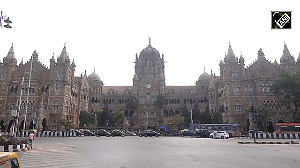Unlike in any other major European capital, meters simply do not exist in Athens.
What does exist is parking anarchy.
Rows of double- and triple-parked cars with flashing hazard lights are an Athens trademark, as familiar as a view of the famed Acropolis.
While Athens promises to emerge as a better city after the Games, city officials warn ample parking is not part of the plan.
On the contrary.
They hope that draconian traffic restrictions during the two-week event may succeed where police crackdowns have failed to persuade car-loving Athenians to take the bus.
"We are going to have a big social experiment. People will have to leave their cars and take the public transport," said deputy Athens Mayor Theodoros Skylakakis.
The logic is simple: special Olympic lanes for official vehicles and restricted access to sports venues, designed to ensure hassle-free movement for the Olympic family, will make driving and parking for everyone else a nightmare.
With more buses, extensions to the metro network, a new suburban rail and a tram linking the city with the sea -- all due for the Games -- the hope is that public transport will have more appeal.
TRANSPORT NEGLECT
But experts doubt one summer can change the way the city has functioned, or rather malfunctioned, for decades.
"They can't be serious...The Olympics will be a special period. It's not designed to change the mentality," said Thanos Vlastos, associate transport professor at Athens Polytechnic.
After years of neglect for mass transport and pedestrians the car rules supreme in Athens and many believe parking anywhere and at no cost is an Athenian's right.
Most houses in this overcrowded city of four million have no parking at all. Even in the fashionable central Kolonaki area a question about a reserved car space raises eyebrows.
The few who refuse to join the double-parking habit pay up to 20,000 euros, the price of a new medium-class car, to own a parking spot. For the rest it is a free-for-all.
Bus stops, corners, pedestrian walkways and crossings, even ramps for the disabled, are favoured parking spots. Nowhere is off limits for cars, motorbikes and scooters.
Olympic officials fear any efforts to make Athens more accessible for the disabled will be rendered meaningless.
"The car is king...what is the point of building ramps when people park all over them?" International Paralympic Committee president Phil Craven said after visiting Athens last year.
Athens Mayor Dora Bakoyannis promises her beefed-up municipal police will wage a merciless war against anti-social parking.
A planned clean-up of the streets includes towing away more than 12,000 abandoned cars.
But experts warn that the crackdown is doomed to fail.
"You can't stamp out illegal parking just using the police," said Vlastos.
PARKING FINES
With space so scarce -- some estimates say the centre needs 60,000 more spots, another says there is just one legal space for every 100 cars in greater Athens -- ticketed drivers easily become repeat offenders and few bother to pay parking fines.
"I never pay the tickets from the municipal police. Why should I? They are understaffed, have outdated records, how are they going to find me?" said one resident.
Even building more car parks is a lost battle.
The government has promised four car parks with 2,000 spaces in central Athens by late 2004, but there are already two million cars in the greater Athens area.
According to some estimates around 70,000 more cars hit Athens streets every year and all efforts to tame this growth have failed miserably.
Take the odd-even rule introduced to fight pollution in the early 1980s when Athens had half a million cars.
It allows entry to the centre to cars with odd licence numbers on odd dates, and to those with even plates on even days. The effect? Booming car sales and many two-car households with cars for all the days of the week.
The gleaming Athens metro that opened in 2000 also failed to provide the much-hoped for breakthrough as its benefits got largely cancelled out by a Greek car-buying spree after cheap credit became available with the adoption of the euro in 2001.
Two-thirds of Athenians still prefer to drive a car or a motorcycle or take a taxi. They complain buses are too slow and the metro does not go far enough.
Experts say providing more buses, bus lanes and trams, introducing parking meters and convincing Athenians that parking is no longer a free commodity are the only way to ease the misery.
"People just don't accept the idea of paying for parking," said Vlastos.









 © 2025
© 2025